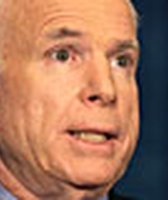Stand up for the facts!
Our only agenda is to publish the truth so you can be an informed participant in democracy.
We need your help.
I would like to contribute
SUMMARY: Sen. Hillary Clinton proposed a universal health care plan that instantly drew the fire of Republican rivals. No, it's not socialized medicine, despite those claims, but the lack of some details leaves a lot still to be explained.
Unlike a dozen years ago when she proposed a radical reworking of the nation's health care system, Clinton's latest health plan is notable for its tempered approach.
People who are happy with their current health insurance can keep what they've got.
People who haven't been able to afford insurance will get help paying their premiums and plenty of coverage options, from either private insurers or a Medicare-like plan.
But — and this is the big change — people who don't think they need health insurance would have to think again. Under plans put forward both by Clinton and fellow Democratic presidential contender John Edwards, everyone would be required to have health coverage.
Other highlights of Clinton's plan, which she says would cost $110-billion in its first year, include:
*Opening the Federal Employee Health Benefit Program, which offers dozens of private health plans to members of Congress, to all Americans.
*Providing tax credits for small businesses to make employee coverage feasible.
*Offering a public plan modeled on Medicare, although the Clinton plan promises this can be done without creating a new bureaucracy.
*Requiring insurers to offer coverage to anyone who applies and pays the premium, without consideration of pre-existing medical conditions.
Clinton's proposed mandate that healthy Americans join the insurance pool to offset the sickest members triggered an onslaught of criticism from Republican candidates.
In Tampa on Monday, Sept. 17, 2007, Rudy Giuliani characterized the Clinton plan as "socialized medicine."
"What Hillary Clinton wants to do is Hillarycare, which is demand, command of coverage, which is going to be government-controlled, government-regulated medicine," Giuliani said.
Even Mitt Romney, who made universal coverage key to his health reforms while governor of Massachusetts, critiqued the concept when rolled out on a national scale.
"It's a European-style socialized medicine plan — that's where it leads," he said.
Whatever the Clinton plan's faults, experts outside of the political arena agree that it's not socialized medicine. Clinton's proposal relies heavily on private insurance companies to provide coverage for people who aren't already insured.
"If the insurance industry calculates this carefully, they'll make money off it," said Uwe Reinhardt, a professor of economics at Princeton University.
Reinhardt and others said the Clinton plan strikes a workable balance between private and public interests. "I think it is really very much in the mainstream of thinking on health policy," Reinhardt said.
Clinton's plan targets the nation's 47-million uninsured, making the case that the average insurance premium of $12,000 a year is unaffordable for many.
"For half of Americans, this total premium accounts for at least one-fourth of their annual income," Clinton says in the plan.
That's a bit of an overstatement. An individual's share of the annual insurance premium is considerably less than the total, and only about 7 percent of the median income in the United States. Clinton's campaign defended its analysis, saying most uninsured don't have the option of employer coverage, meaning they would pay the entire premium themselves.
Robert Blendon, a professor at the Harvard School of Public Health, said Clinton was wise to narrow the plan's focus to the uninsured and small business needs.
"It leaves everyone else alone," he said. "It's much more politically cautious."
Even the mandate of individual coverage is hardly revolutionary, Blendon said, having been embraced on the state level by both Romney and Republican Gov. Arnold Schwarzenegger in California.
"In 1993, her plan called for government responsibility for providing health insurance," Blendon said. "Now the individual is responsible if they can pay. There's nothing socialized about requiring people to insure themselves."
While Clinton's plan lays out a framework for universal health coverage, it is short on specifics. It calls for tax credits for individuals to get insured and for different types of companies to offer coverage, but the amount of those credits isn't specified.
Also unexplained is the mechanism for controlling premium increases, or for limiting what the plan calls private insurers' "excessive profits."
The $110-billion first-year cost is paid for, according to the Clinton plan, by a host of savings that seem ambitious.
Her budget calls for $54-billion to be returned to the U.S. Treasury by ending tax cuts to households making over $250,000 a year, a realistic estimate based on Congressional Budget Office reports. But over half of the savings relies on such things as phasing out overpayments to Medicare HMOs, which Congress has proven reluctant to do so far.
Clinton also estimates the federal government can save $35-million by implementing health information technology and taking better care of chronically ill patients. Neera Tanden, policy director for the Clinton campaign, defended the candidate's estimates as "extremely conservative." But critics say such savings could be ephemeral.
Dr. David Himmelstein, an associate professor at Harvard Medical School and a proponent of a single-payer national health system, said hopes for saving money through electronic medical records or other technology are "pure vaporware."
"And though there's some evidence that disease management improves care, there's no evidence it saves money," he said. "People getting in to see their doctors means more cost, not less."
Himmelstein and others also question how the federal government will be able to force individuals to take insurance. Penalties have not yet come due for people who failed to enroll in such plans in Massachusetts, where the deadline for enrollment was July 1.
"No one knows what happens when push comes to shove," Himmelstein said.
One thing seems certain. Even with universal coverage, the likelihood of an individual's health insurance premium declining is slim.
"Premiums are always going to go up," said Kenneth Thorpe, a health policy professor at Emory University in Atlanta. "But they'll go up at a slower rate, in a more predictable fashion under Clinton's plan."
Our Sources
Interview with Uwe Reinhardt, a professor of economics at Princeton University
Dorland's Illustrated Medical Dictionary, Definition of "socialized medicine"
Congressional Budget Office, Budget Options, Feb. 2007
Perspective; Hope And Hype: Predicting The Impact Of Electronic Medical Records, September-October 2005, David U. Himmelstein and Steffie Woolhandler





























